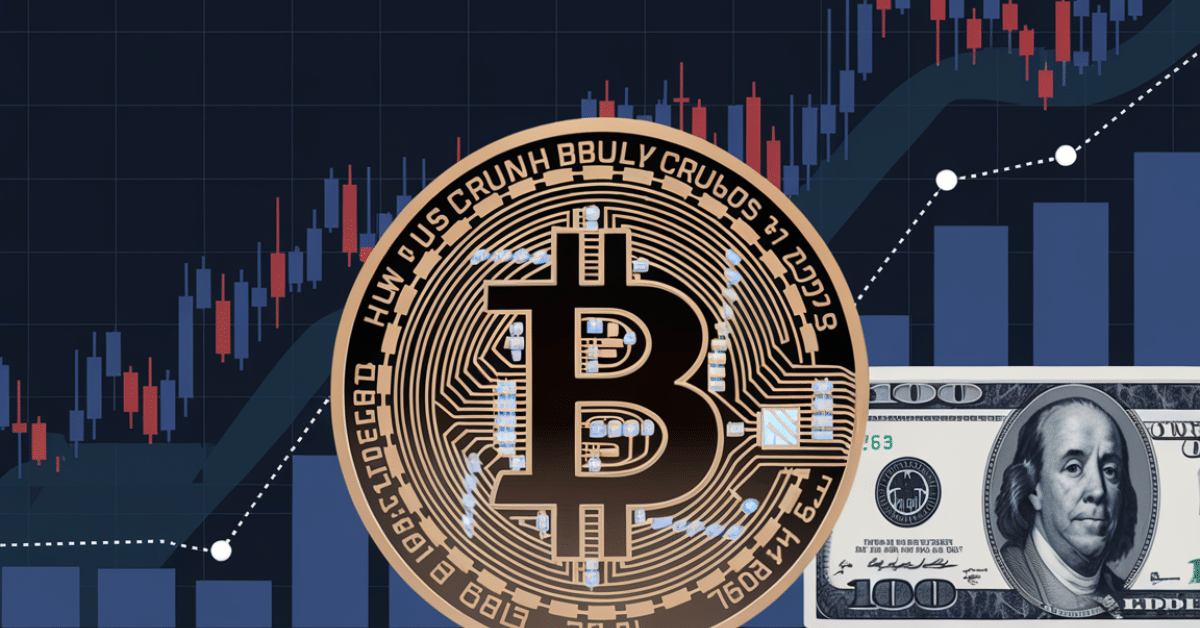Key Takeaways
- The price of Bitcoin is subject to internal and external factors like market competition, scalability, and regulation.
- Though unlikely, a hypothetical case where Bitcoin crashes to zero could lead to a loss of confidence in crypto, a massive sell-off, and external ripple effects on the financial market.
- A Bitcoin crash to zero would negatively impact crypto companies and crypto miners and lead to widespread financial losses.
- While it’s technically possible for Bitcoin’s price to crash to zero, it’s practically impossible now, considering that the future of finance is digital, and cryptocurrencies are at the very center.
Cryptocurrencies have made deadlines for several years now, and the value of Bitcoin, whose value was zero at its inception in 2009, reached a new all-time-high when it reached over $100,000 in December 2024. This article explores the hypothetical case of the impact on investors and global finance if the price of Bitcoin crashes to zero someday.
The Growth of the Crypto Market
The expansion of the crypto industry from its inception in 2009 to the present continues to surprise many people. According to CoinMarketCap, from only Bitcoin in 2009, there are now over 11,000 different digital assets with a total market capitalization of over $3.76 trillion as of January 2025. Over 100 million unique crypto wallets are currently holding these digital assets, the number having trebled since 2018.
Since it was introduced to the world by the mysterious Satoshi Nakamoto, Bitcoin, the first digital currency, has experienced a roller coaster ride, with the price fluctuating up and down due to external factors. Considering the volatile nature of the cryptocurrency market, where prices can move like a pendulum, it’s only natural that some people can speculate about the possibility of a total collapse of the global cryptosystem and the cost of Bitcoin crashing to zero. While this looks like a simple question, the answer requires a deep analysis of the context of the Bitcoin ecosystem to get an answer.
What Factors Drive the Value of Bitcoin?
Unlike stablecoins that derive their value from tangible assets like the US dollar or gold reserves, the value of Bitcoin isn’t tied to any tangible asset, meaning you must understand the mechanics and factors that drive BTC and give it the value it has on the market. It appears that Bitcoin and other similar cryptocurrencies are vulnerable to significant price drops or hikes, which is why some people are afraid that it could someday crash in a matter of months or even days or minutes.
The historical performance of Bitcoin and other cryptocurrencies over the last few years has proved that crypto is subject to volatility. Moreover, several factors have impacted crypto positively or negatively. For example, Donald Trump’s statement in June 2021 that Bitcoin was a scam, or Tesla CEO Elon Musk’s announcement in May the same year that the firm would no longer accept payment in Bitcoin had the crypto lose at least 55% of its value from $57,352.77 to a low of $31,397.31.
On the positive side, Bitcoin’s value rose again later that year and hit a record $64,863 when El Salvador became the first country to declare BTC a legal tender. Enter regulatory changes, and in 2022, the value dropped again after cryptocurrency exchange Binance froze withdrawals following the collapse of cryptocurrency exchange FTX, and the value dropped to November 2020 at a yearly low of $16,195.59. Fast forward to July 2024, and Donald Trump’s remarks during a campaign rally in Nashville supported Bitcoin, and the price surge began culminating in the record-breaking figure of $108,000 in December 2024.
Can Bitcoin’s Price Really Crash to Zero?
In light of Bitcoin’s price fluctuating up and down due to external factors, it could reach a null state where the value of Bitcoin crashes to zero. While such an event isn’t likely to occur soon, we must investigate the factors that could hypothetically lead to Bitcoin becoming valueless. So, technically speaking, the price of a cryptocurrency can crash to zero, as seen in the case of Terra Luna in 2022.
Some profound changes will need to occur for a digital asset as popular and valuable as Bitcoin to experience such a catastrophic drop in value. Some of the likely scenarios that could make it possible for the value of Bitcoin to crash to zero include the following:
Lack of Intrinsic Value
Some critics argue that Bitcoin doesn’t have an intrinsic value. They suggest that if the entire world deemed the digital asset valueless, the price would fall as holders struggle to sell it back into government-issued currencies or other valuable assets. However, note that an asset’s worth lies in the perception of those willing to pay for it. For the price of bitcoin to crash to zero, all crypto enthusiasts would need to believe it’s valueless.
Bitcoin Gets Banned
The other scenario that could cause a catastrophic drop in Bitcoin’s value would be if all governments worldwide banned its use and made it illegal. Should it ever become illegal to own or use Bitcoin, the coin would lose most of its value in some countries. However, for the value of Bitcoin to crash to zero, governments worldwide would need to shut down mining activities worldwide. Only offline nodes of the digital asset could be rendered useless, such that no single node exists in the network, and Bitcoin can no longer be transferred in the peer-to-peer network.
Replaced by an Alternative
With the ongoing technological developments, someone could replace Bitcoin with another superior cryptocurrency. While new digital assets continue to be launched month after month, most fail, but that doesn’t mean BTC can never be replaced. If we ever get to a point where no one needs to hold Bitcoin anymore, the majority of the holders could decide to sell their holdings and drive the price to zero.
The Price of Bitcoin is Unlikely to Crash to Zero
While it remains technically possible for the price of Bitcoin to crash to zero, there are strong reasons why the worst-case scenario is unlikely to occur any time soon. Among the factors that support the existence of BTC’s value in the future include the following:
The Bitcoin Blockchain
Bitcoin is built on a robust underlying technology, meaning that its operations are unlikely to stop even after the last coin has been mined. The underlying blockchain, a decentralized digital, gets updated by different blockchain nodes (computers) globally. The blockchain is designed so that online BTC trading can continue as long as one node is operational. For a system with over 100,000 active nodes, some in space, and more than one million miners globally, you would need to shut them all down for BTC to die. Currently, some nodes exist.
Increased Utility
Bitcoin’s utility has expanded. Originally designed as a decentralized peer-to-peer payment network to facilitate the transfer of wealth without third-party intervention, BTC has now become a profound store of value among institutional investors. At the same time, decentralized finance (DeFi) has introduced a wide range of new financial products and services, disrupting traditional finance systems.
Institutional Investment
Apart from individuals, thousands of businesses and corporate bodies globally have integrated Bitcoin into their systems, and it is being accepted as a form of payment by thousands of merchants worldwide. Moreover, countries like El Salvador have already accepted Bitcoin as legal tender. As institutional adoption grows and many businesses integrate Bitcoin into their balance sheets, Bitcoin’s place in the global economy is almost becoming irreversible.
Passion for Crypto
As we said earlier, the worth of any asset is dictated by human psychology. Every human being on earth would need to denounce Bitcoin in order for it to stop being a real-world asset. There is talk in the United States and other countries about building a strategic Bitcoin reserve fund, besides the possibility of enacting a clear regulatory framework to enable cryptocurrency innovation to thrive unhindered. As a result, even if Bitcoin encountered a big crash, there’s every chance that thousands of investors who believe in it would still hold on to their BTC stashes because they think it would still bounce back like it has done severally in the past.
Conclusion
In asking ourselves what would happen if Bitcoin’s value crashed to zero, we’ve discovered reasonable arguments on both sides of the divide. While those who support the crypto revolution believe that the technology behind Bitcoin has introduced safety, transparency, and efficiency relative to traditional financial models, critics argue that Bitcoin is nothing more than a bubble that will burst soon.
Should Bitcoin’s price crash to zero for any reason, it would lead to the collapse of the entire cryptocurrency industry since the fate of all altcoins is somewhat tied to the fate of the flagship cryptocurrency. If the crash happened, it would be catastrophic enough to affect millions of people and institutions worldwide, seeing how it has gradually been integrated.
Regardless of what will happen to this newly emerged digital asset in the next few years, one thing that stands out is that Bitcoin and other digital assets are poised to play a larger-than-life role in the financial sector and other industries into the future. As a result, for the price of Bitcoin to crash to zero, which is an almost impossible situation, something catastrophic would need to happen.



























